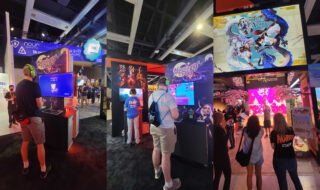Marvelous recently announced organizational changes that will see the Marvelous USA and XSEED Games brands publish as separate labels in North America, where previously everything was published under the XSEED Games label. To talk more about these changes, Gematsu spoke to Marvelous USA and XSEED Games executive vice president Kenji Hosoi at PAX West 2024, where both brands are showcasing a diverse lineup.
Get the full interview below.
First thing’s first—what was the reasoning behind separating XSEED Games and Marvelous USA into distinct publishing labels?
Kenji Hosoi, Executive Vice President, Marvelous USA / XSEED Games: “I think it’s always been slightly confusing for our fans since we were both XSEED Games, as well as Marvelous USA. Even in online comments, sometimes people would refer to us by both names in one sentence, so the brand separation was to mainly clarify which titles fall in the Marvelous category and which ones are XSEED’s. The Marvelous side will consist of titles that are internally developed by our Marvelous dev team—like the Story of Seasons and Rune Factory series, as well as Daemon X Machina and others. The titles that we license from external developers and publishers, such as the indie titles Potionomics, Sakuna: Of Rice and Ruin, and Freedom Planet, would fall into the XSEED category.”
I understand differentiating Marvelous content from third-party content, but then you have Marvelous Europe who is still publishing that third-party content in Europe, and Marvelous the parent company still publishing in Japan. So why is there only that separate in North America, as opposed to just publishing everything as Marvelous USA going forward?
Hosoi: “Unlike Marvelous Europe and Marvelous Japan, our company originated as XSEED Games, and many of our fans have been with us throughout our decades long journey of bringing games from Japan to a western audience from before we teamed up with Marvelous. Many people still think of us as XSEED, so we figured the easiest way to represent both sides of our business was to separate the brand name based on the two types of titles (external or internal dev) we handle.”

So what opportunities do these changes present for XSEED Games in terms of expanding your games lineup? Will we see more third-party game announcements from XSEED Games than usual as a result?
Hosoi: “The brand separation is specifically to clarify which titles will fall under which brand name, so aside from that, our operation itself will not change. As each game we consider for a publishing deal is different, we’ll continue to pick up third-party titles that fit our target audience, expected game quality, and how it performs in our internal title evaluation process. If we get lucky and receive a wave of titles that fits with the XSEED brand, then we’ll have more to publish, but the same logic applies if we are not as lucky in any given year.”
XSEED Games already has quite the number of upcoming third-party projects. Will these changes affect the way the company approaches partnerships going forward?
Hosoi: “No, not at all. As mentioned previously, there really are no operational changes and we’ll continue doing everything we’ve been doing for the last decade.”
XSEED Games has published third-party projects from developers big and small. What’s the brand’s process when it comes to actually discovering these games?
Hosoi: “There are multiple avenues by which we discover titles. Sometimes we get direct emails or introductions from industry friends, which is the usual process for many third-party titles developed by bigger companies. Sometimes we’ll receive pitches through our website, though we haven’t had one that’s come through that we’ve actually ended up publishing. Other times, we’d find potential titles at game shows like PAX, Gamescom, Tokyo Game Show, and BitSummit. Cuisineer, one of our indie darlings, was actually discovered by our president Ken Berry when he visited PAX East, and then later introduced to our Marvelous Europe office for publishing. Ken meeting the developers Edelweiss at BitSummit was also the start of our partnership on Sakuna: Of Rice and Ruin.”
Does fan demand or feedback play any part in determining which projects XSEED Games decides to sign?
Hosoi: “100 times yes! Like many things in our lives, feedback is some of the most valuable info we get. The more fan love there is for a title, the easier it becomes to make a decision. If there’s a big demand that’s easily measurable like Steam Wishlists, social media follows, Kickstarter pledges, the first step of quantifying market demand is that much easier to do. And if proving market demand is easy, then it becomes easier to prove to decision makers why a game is ‘good.’ The process of convincing someone that a game is good enough to merit the risks inherent in publishing is actually quite hard, and fan feedback brings a very important piece to the table that’s easy to digest for everyone involved.”

Can you talk about how your PAX West 2024 lineup is different from previous events with this new distinction between Marvelous USA and XSEED Games?
Hosoi: “On a fan / attendee level, the booth experience will be the same except that we have a massive lineup this time around! From the publishing side it’s helping us to bring more titles than we’ve historically taken, including creating booth experiences for upcoming Marvelous USA titles Farmagia and Rune Factory: Guardians of Azuma, as well as a playable demo for Death the Guitar. These combined with our big lineup of playable XSEED Games-published titles including Corpse Party II: Darkness Distortion, Cuisineer, Moonlight Peaks, Potionomics: Masterwork Edition, Slitterhead, The Big Catch, and Ys Memoire: The Oath in Felghana has made it a bit of a challenge to fit all in one booth, but it’s one we were eager to take on to make sure fans have the best possible experience when they stop by.”
XSEED Games once dipped its toes into the visual novel genre with London Detective Mysteria, but we haven’t seen any visual novel releases since. Would XSEED Games ever consider localizing more visual novels in the future?
Hosoi: “As someone who was really pushing to pick up the PlayStation 3 version of 428: Shibuya Scramble back in the day, personally, I wish we could do more visual novels. Unfortunately, that genre of games is very text heavy obviously, and they take a long time to localize. We work on a lot of text heavy games like the Story of Seasons and Rune Factory series, and we just don’t have enough resources at the moment to pick up visual novel titles on a regular basis. If we exponentially grow our localization team in the near future, then it’s definitely possible, but I don’t see how we can handle frequent visual novel releases at this time.”
With the popularity of Vanillaware titles, would XSEED Games ever consider remastering Muramasa: The Demon Blade or Grand Knights History for current-generation platforms?
Hosoi: “This is a question we get asked quite frequently at game shows. All I can really say is I wish we could! We’re all fans of Vanillaware, as everyone should be, and both titles mentioned would be a great addition. If we’re ever given the opportunity, it’d be a fun party for us!”
Are there any plans to localize future projects in more languages such as Brazilian Portuguese and LATAM Spanish?
Hosoi: “Brazilian Portuguese is definitely a language we get asked about once in a while. Given the massive amount of text in some of our games, I’m not sure if it’s cost effective enough for us to keep BP as a default language for all of our games just yet, but we’ve had a few titles we’ve included BP as a localized language, so we’ll definitely be looking more into the LATAM languages as our next expansion in our localization process.”
It looks like we’re out of time. Thanks so much for talking to us, and enjoy the rest of PAX West!
